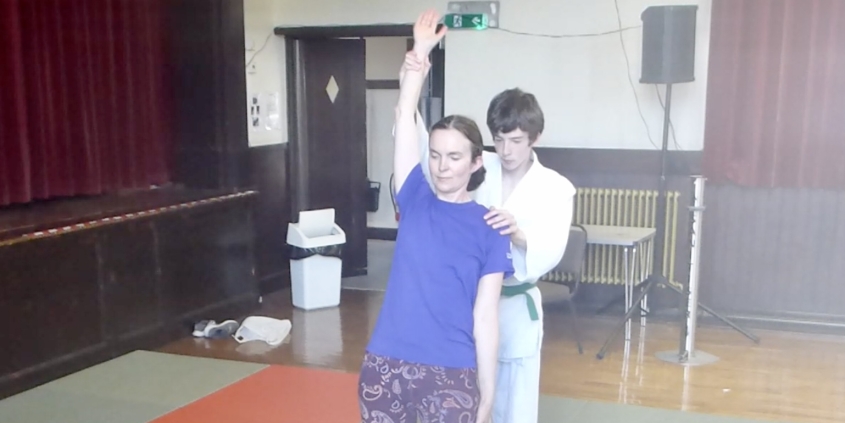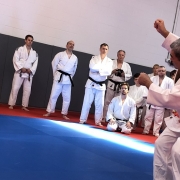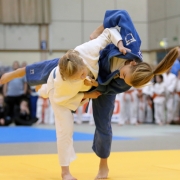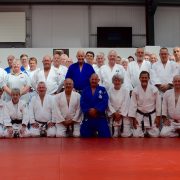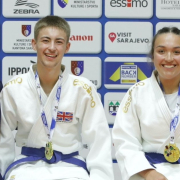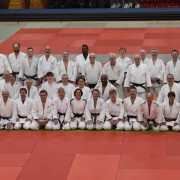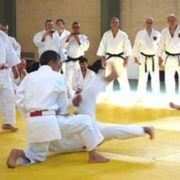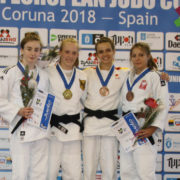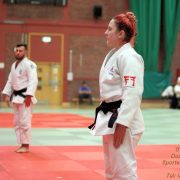BRITISH ONLINE JU-NO-KATA CHAMPIONSHIPS 2021 – RESULTS
| Tori | Uke | Club | Area | |
| Juniors | ||||
| Gold | Peter Wilson | Rebecca Holland | Staveley | Northwest |
| Silver | Sophie Davis | Cerys Jones | Samurai | Midlands |
| Bronze | Cerys Jones | Sophie Davis | Samurai | Midlands |
| Bronze | Jasmine Yoganathan | Ashwin Yoganathan | Samurai Olympic | Wales |
| Seniors | ||||
| Gold | Sylvia Barton | Gillian Elliot | Staveley | Northwest |
Peter Wilson (pictured), who won gold in the British Shadow Kata Championships at the height of the 2020 lockdown, took gold again in this latest online kata competition. Not having a regular ju-no-kata partner, Peter enlisted his mum, Rebecca Holland, as his uke. Rebecca had never even done judo before but for ju-no-kata, where throws are not completed, it is possible for a non-judoka to participate. Indeed, the kata is designed so that people new to judo can do the kata when they start judo and continue studying it for many years to come. Jigoro Kano also designed ju-no-kata so that no judogi is required, and therefore Rebecca performed the kata in ordinary clothes.
Their main rivals were the Samurai Judo Club pair of Sophie Davis and Cerys Jones, both competitive contest judo players and British Pre-Cadet Championships medallists. They entered both ways round, that is, once with Sophie as tori (the attacker) and once with Cerys.
Their videos and those of the other entrants were submitted to the judges for scoring. The results were an exact tie of 113 marks each for Peter/Rebecca and Sophie/Cerys, so the judges had to return and re-mark the kata, and this process gave Peter and Rebecca a score of 114, making them the British Champions.
The reverse pairing of Cerys and Sophie took the one bronze. The other bronze went to the younger Welsh pairing of Jasmine and Ashwin Yoganathon from Samurai Olympic Judo Club. They took another aspect of ju-no-kata, which is that it does not require a mat area or even a dojo, and filmed their kata on a Swansea beach! They later recorded another version in a dojo, but it illustrates the nature of ju-no-kata, which is that it can be done anywhere.
Just one medal, the gold, was awarded in the seniors to the pairing of Sylvia Barton (Peter’s coach) and Gillian Elliot, again of Staveley Judo Club, who produced a fine display. The judges felt that their kata was consistent and very well controlled.
British Judo Young Kata Awards
The BJA have a series of award certificates that young players can achieve in kata. There are five of these, which can be downloaded and used in clubs. Any BJA Level 2 Coach or above can assess three of them, with Level 3 coach or Kata or Senior Examiner qualification only needed to assess the top two (Advanced and Expert Awards). Coaches can download the simple syllabus and the certificates from the Kata Resources section and then just train the players, assess them, and print off the certificates with their names. Awards are available for both tori (the thrower) and uke (the players thrown). This is a FREE service for all clubs.
This is intended as an extra achievement pathway for players, and is good for both recreational and competitive players, because kata improves your judo whatever your level!
BJA Young Kata Beginner Award
Requirement: Demonstration of EITHER set 2 or set 3 of Nage-no-kata.
BJA Young Kata Intermediate Award
Requirement: Demonstration of BOTH set 2 and set 3 of Nage-no-kata.
BJA Young Kata Advanced Award
Requirement: Demonstration of sets 1, 2 and 3 of Nage-no-kata.
BJA Young Kata Expert Award
Requirement: Demonstration of full Nage-no-kata.
BJA Young Atemiwaza Award
Requirement: Demonstration of the four techniques in Nage-no-kata from blows.

